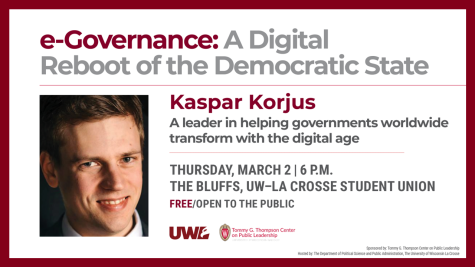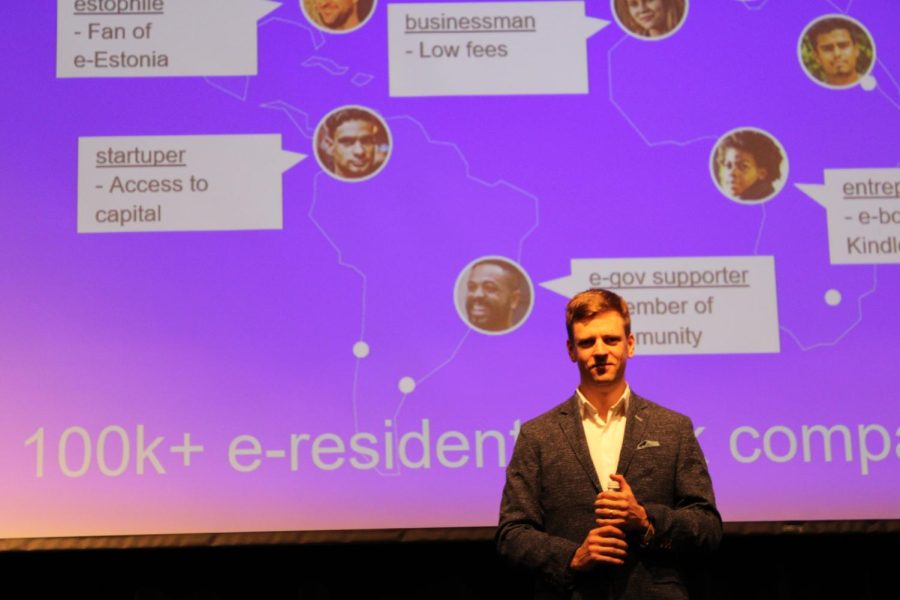E-Residency expert Kaspar Korjus visits UWL to explain a new digital nation
March 7, 2023
On Thursday, March 2, the University of Wisconsin-La Crosse, in partnership with the Tommy G. Thompson Center on Public Leadership, hosted Kaspar Korjus to present on the topic of e-Residency redefining a nation-state.
Korjus is the former chief executive officer of e-Residency in the Government of Estonia. He is the current chief product officer of Pactum, an artificial intelligence (AI) based system that performs business negotiations for companies.
“In 2014, Estonia launched a first-of-its-kind e-Residency program. Under this fascinating and innovative policy non-Estonians anywhere in the world can become e-Residents of Estonia,” said Alex Tahk, Director of the Tommy G. Thompson Center on Public Leadership, in his introduction of Korjus.
According to the e-Estonia website, e-Residency is a digital identity that provides access to Estonia’s business environment.
The topic received the interest of United States Chief Technology Officer, Megan Smith, who invited Korjus to attend a three-week session in the White House in 2018. “We shared how the lessons of Estonia could apply to different states in the US,” said Korjus. Here he was also recognized by Smith as one of the 20 global digital leaders.
While launching e-Residency, it was unknown to Korjus exactly who would apply to the program and why people would do it, but he did know one thing; “In the world of digital nations you don’t have borders and as a nation, you don’t need to conquer other lands to become wealthy and increase your economy, you can just offer more services.”
Neighboring Finland and Russia, Estonia is a small country with a population of just over 1.3 million. This number refers to the citizens physically living in Estonia, not the thousands of e-residents that have taken advantage of the program Korjus helped to build.
Korjus began his presentation by first describing how Estonia developed as a digital nation to eventually reach the point where e-Residency would be widely accepted. “I would like to share with you the journey of how to transform one nation from ex-Soviet Union where you don’t have anything, to a digitality very advanced nation within a matter of years,” said Korjus.
In Estonia, the development of nation-states has been divided into five different phases.
Korjus titled Phase One ‘Getting to learn what technology is’; a phase Estonia skipped entirely. “By the time we [Estonia] gained independence in 1991, computers and the internet were quite more advanced already,” said Korjus. Countries with more extensive histories have a harder time leaving this phase, as they are accustomed to using paper.
“I personally don’t have a signature,” said Korjus “I don’t know how to sign things on paper. If someone asked me then I am doing random things with my hand, because we [citizens of Estonia] have always signed digitally.”
Phase Two Korjus titled ‘Becoming digital’. Here the first step is to have a digital identity along with a digital name. “My name between humans is Kaspar, but computers are better with numbers … So my actual name is 38712012796, computers understand that number,” said Korjus.
This digital name allows Korjus to interact with his government and utilize the services it provides. “The first service was e-banking, but now during the last ten years 99.8% of services are all fully online,” said Korjus. Other services include driver’s license renewal, tax declarations, and fulfilling medical prescriptions.
Through Estonia’s digital government services the tax declaration process, or filing your taxes, takes seven seconds on average. Korjus said, “All the taxes are calculated for you because they [Estonia’s e-Residency] have all the data and then you just need to review it and sign it.”
‘Becoming Borderless (Community)’ Korjus identifies as Phase Three. When government services become digital it begs the question of whether Estonians living abroad should have access to them. To Kaspar and the Estonian government, the answer was clearly, yes. “For example, voting. Yesterday voting started [in Estonia] so I was here in La Crosse, and I was part of my Democracy and I voted in General Elections in Estonia, through my mobile phone,” said Korjus.
Estonia was in Phase Three when e-Residency was born. Korjus asked, “In 2014, the question was if we allow Estonia’s abroad to be part of our digital nation, why should we stop foreigners to be part of our digital nation?”
Korjus described that e-residents are given an ID card, just like the one he has. With that digital ID, they are allowed the use government services to open bank accounts or set up a company in Estonia without ever having to visit.
“Many came just because they wanted to become a part of this future state, others had real reasons,” said Korjus.
One of the “real reasons” Korjus explained was that it allowed citizens of Ukraine, a country not far from Estonia, to run their business through the e-Recidency program. This allows them access to the European banking system and e-services, despite their country being engaged in war.
Korjus said that if numbers continue to grow the concept of a nation-state will change. He said, “The goal is in four years’ time we [Estonia] have ten times more e-residents than citizens and in 15 years’ time we can speak about these numbers in hundreds of millions of people who are digitally connected to Estonia.”
One of these changes may be the elimination of taxation. Korjus proposed the idea that people could directly support their country through Estonia’s own cryptocurrency.
Estonia entered phase four just a few years ago. This phase Korjus identifies as ‘Becoming AI-driven,’ he said, “When you put an AI layer on top of the data and digital services then it can actually start living like a separate human in that sense, work for people and form decisions.”
The final phase Korjus titles, ‘Including everyone via Nation as a service’. “If now Estonia has invested and created this digital platform … there is no reason that other nations all need to do the same thing too,” said Korjus.
Korjus said this phase is already ongoing as Estonia is starting to share its code base and applications with Finland.
Following his presentation, Korjus opened the floor up to questions. In attendance was Karl Kunkle, UWL Dean of the College of Arts, Social Sciences and Humanities (CASSH). He asked, “There is a lot of hyper concern in the US for example about identity theft and people getting other people’s data opening up credit cards, stealing their money, those types of things, so how is this protected against those types of threats?”
Korjus responded, “In Estonia for example, anything that is on paper is not trusted anymore.” Estonia is all digital with no paper records. These digital records Korjus explained are protected through encryption and everything leaves a digital footprint.
To view Kaspar Korjus’s full “e-Governance: A Digital Reboot of the Democratic State” presentation click here.








